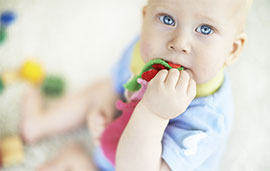Milestones

SPEECH & LANGUAGE DEVELOPMENT MILESTONES
Speech Development Milestones:
Age 3: m, n, h, p, f, b, d
Age 4: k, g, t
Age 5: J, v
Age 6: ing, l, s, r, ch, z, th, sh
Receptive and Expressive Language Development
| Age | Receptive Language | Expressive Language | What Parents Can Do To Help |
| 0-3 months |
-Startles to a sudden noise. -Soothed or calmed by your voice. -Turns head toward you when you speak. -Appears to smile or focus on voices when spoken t.o -Wakes up in response to loud sounds. |
-Coos, gurgles. -Mimics facial expressions. (stick out tongue) -Has different cries for different circumstances. (hunger, pain) |
-Read simple board books. -Sing songs to your baby. |
| 3-6 months |
-Turn or looks towards sound. -Responds to changes in your voice. -Enjoys toys that make sounds. |
-Repeats simple sounds. (baba, ooh) -May squeal or shriek with excitement. -Laughs out loud. |
-Using simple signs. (more, byebye, eat) -Imitate movements, faces, oand sounds your baby makes. |
| 6-10 months |
-Respond to name. -Respond to environemental sounds. (door bell, telephone) -Begin to respond to requests. (byebye, come here) -Comprehends no. -Looks at familiar person when named or object when talked about. |
-Babbles to self. -Babbling may sound speech-like in tone. -Uses variety of sound combinations. -May begin signing. -Expresses preferences even if nonverbally. |
-Continue signing. -Sing interactive songs. (itsy-bitsy spider, wheels on bus) -Talk about what you are doing while doing it. |
| 10-15 months |
-Enjoys games of peekaboo. -Points to familiar objects or people when asked. -Can follow simple 1-step commands with gestures. |
-Imitate simple sounds. -Uses at least 1 word meaningfully. -Plays with voice, variety of sound combinations. |
-Imitate sounds and words your child says. -Ask simple questions when reading. (who, what, where) -Keep reading and talking<.br> |
| 15-18 months |
-Follows simple commands without cues. -Can point to some body parts. -Begin identify pictures in books. -Begin identify common objects. |
-Begin 2-3 word phrases to make requests. (more milk) -Repeating words. -Begins communicating with more words than gestures. |
-Talk about common vocabulary during routines. -Label items and actions in environment. |
| 18-24 months |
-Respond to simple yes/no questions. -Understand simple phrases. -Understands you when you call from another room. |
-50 words. -Ask for foods and objects. -Uses possessive pronouns. (mine) -Regularly uses 2-3 word phrases. -Makes animal sounds. |
-Read together.
-Have child point to objects in books. -Encourage child to use words not gestures. -Model good language. -Talk about what is going on around you. |
| 24-36 months |
-Can choose things by size. -Follow 2-step directions. -Understand actions. -Listen to simple stories. -Understand taking turns. |
-Vocabulary 250-1000 words. -Speech is clearer. (75% intelligible) -Uses simple pronouns. -Use descriptive words. (big, happy) -Knows some spatial concepts on, in. -Uses 3+ words in sentence. -Answer simple questions. -Use inflection when ask question. |
-Model correct grammar. -Describe in details about events. (first, then) -Expand on what your child says but not expecting them to repeat it. |
| 3-4 years |
-Identify colors. -Categorize items. -Understand more/most. |
-Uses ing verbs. -Put together 4-5 words in sentence. -Complete analogies. -Carry on short conversation. |
-Lay with sounds and language making silly word combinations. -Continue reading. -Label feelinfs. -Work on sequencing events. -Label feelings. |
| 4-5 years |
-Understand most of what is said to him/her about recent, past, present,
future events. -Knows a variety of colors, shapes. -Understand spatial concepts next to, behind. -Follow complex directions. |
-Answer why questions. -1500 word vocabulary. -Defines words. -Uses some irregular past tense verbs. -Can describe how to do something. |
-Ask open ended questions. -Provide definitions of new words. -Expose to a variety of activities with new vocabulary. |
| 5 years |
-Understand time concepts. -Understand qualitative concepts. -Understand most conversations. -Complete 3-4 step directions. |
-2000+ word vocabulary. -Can explain at least 3 stage sequences. -Sentences 8+ words. -Repeat sentences. -Engage in elaborate conversations. -Use adjectives to describe. -Use past tense forms. |
-Explain new vocabulary. -Conversations. |
